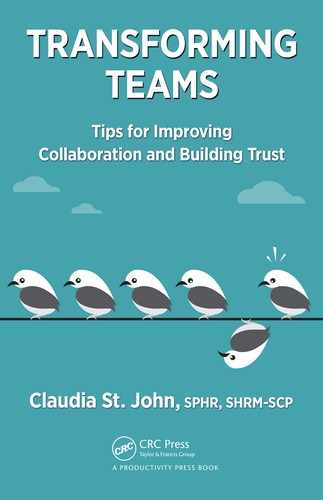204 ◾ Transforming Teams
the emotions of others and nd ways to collaborate
despite those emotions. Simply stated, the more we
are able to manage our own emotions and handle the
emotions of others, the higher our emotional intelli-
gence or EQ.
There are numerous books and behavioral assess-
ments that discuss the science of emotional intelligence,
or EQ as it is commonly known. We recommend
the EQ assessment developed by Target Training
International, Ltd.
Conversations to Hold Peers and Others
Accountable for Their Promises
When teaching your team about promises and trust,
ask them if they want to be held accountable for their
actions. You’ll nd they usually do. But when you ask
them if they feel comfortable holding peers or superiors
accountable, particularly those over whom they have
no authority, chances are they will say “no.”
This is the perfect time to discuss the need to hold
each other accountable. Have them come up with some
ways that they might do so. Have them role-play and
practice with each other so they can learn that it is not
as difcult as they imagine, particularly when their
peers are asking for that accountability and feedback.
Give your teams a week or so and then ask them
to give examples of how they held a peer or superior
accountable. With more practice, these conversations
become much easier.
What Eliza Knows—Resources for Managers ◾ 205
Conversations to Avoid Fake Consensus
and to Encourage Healthy Disagreement
These conversations are most difcult for high Supporters
and Controllers who like to avoid conict. It is important
for them to understand that this fake consensus leads
directly to lack of trust, as it is a failure to be sincere. As
a manager, if you can create a space where such conver-
sations are safe and can emphasize that fake consensus
leads to broken trust, you are more likely to get your
team members to voice their opinions more openly.
Conversations about Broken Trust and
about Actions versus Intentions
As Charles Feltman says in The Thin Book of Trust, to
distrust someone is a choice. You can choose to trust
or to distrust. If both parties are willing to discuss a
breakdown in trust, it is essential that they rst listen
openly to the actions that caused the breakdown. To
move forward, however, they need to ask and listen to
the intentions of each other. In most instances, people
cannot move forward to a place of trust because they
keep their focus on the past actions and the stories
they tell themselves about those actions instead of
focusing on the intentions.
Conversations about Feedback and Expectations
One of the most important roles for a manager is to set
expectations and to provide regular and meaningful
206 ◾ Transforming Teams
feedback about those expectations. All too often, man-
agers reserve their feedback for criticism and correc-
tive action, or for annual reviews, which tend not to be
timely or particularly relevant.
The more meaningful and frequent your feedback
conversations are, the clearer an understanding your
employees will have about your expectations. Most
importantly, if you see employees behaving well or in
ways that you would like to support, spend some time
providing positive feedback. If you celebrate behaviors
you desire, people are more likely to repeat them in
the future.
The Badger and Coyote Bring It All Home
The tale of collaboration between the badger and the
coyote is true. As remarkable as their collaboration
may seem, we need look no further than our own
backyards to discover a multitude of collaborative spe-
cies that create a rich, diverse ecosystem that is inter-
related in ways beyond our understanding. One thing
is certain: in nature as in business, diversity makes all
systems stronger.
Many managers mistakenly believe that they would
be much more successful if they had 100 carbon copies
of their best employee. This is simply not true—not in
business and not in nature.
Instead, the more we can appreciate our own
strengths and weaknesses and the strengths and weak-
nesses of others, the more we can focus our skills and

What Eliza Knows—Resources for Managers ◾ 207
put to use the best of all our team members. If done cor-
rectly and with some luck, we too can enjoy the rewards
of collaboration like the coyote and badger.
Happy hunting!
Eliza’s Golden Nuggets for Managers
Never throw peers under the bus
Be mindful of the stories you tell yourself
e only person you can change is yourself
Never complain down
Feedback rst, nal and frequent
Be the change you seek
Bring three solutions with your problem
Listen
Intentions trump actions
e bigger the problem, the greater the opportunity
..................Content has been hidden....................
You can't read the all page of ebook, please click here login for view all page.
